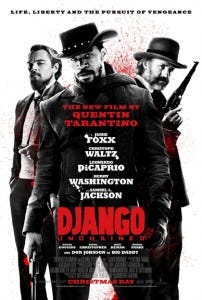Django Unchained, Written and directed by Quentin Tarantino. Starring Jamie Foxx, Christoph Waltz, Leonardo DiCaprio, Kerry Washington, and Samuel L. Jackson. Distributed by the Weinstein Company. Rated R for strong graphic violence throughout, a vicious fight, language, and some nudity. Running time: 165 minutes.
Imagine you’re a slave in the American S…
Keep reading with a 7-day free trial
Subscribe to The Objective Standard to keep reading this post and get 7 days of free access to the full post archives.




